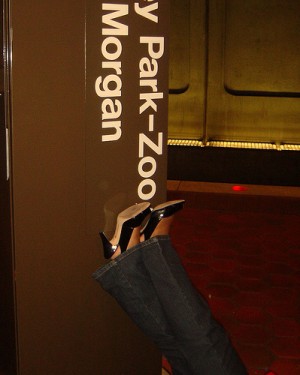Metro: It’s not just for drunks.
“WMATA Board ponders cutting late-night service”, the Greater Greater Washington headline reads. Cue the comment storm from people who are outraged that late-night revelers won’t have a safe way to get home, thus increasing the possibility of those people driving around drunk, killing us and each other. But, wait! There’s more!
NOW cue the knee-jerk fury of those who are outraged that the first group is pandering to drunks. “Why should we enable hard-partying? It’s in no one’s interests! Metro is for commuting to work, not bars!”, they preach. So what’s a transit agency to do? Metro needs to save money and perform maintenance on the creaking, wheezing system that we all complain about; if we want WMATA to fix things, it’s only fair that we give them enough time to address the mile-long list of issues we collectively maintain via Twitter.
All of that is true. So is this: between the sputtering and arguing online, the plight of the other people who rely on Metro is ignored.
Yesterday, when I took my puppy out to turn our street into a latrine, I noticed that Marisol was still sitting in our lobby. That was odd; she usually works the afternoon shift, from 3-11pm. It was midnight.
“Is everything okay?”, I asked.
She smiled, sweetly. “Yeah…I had to stay a little bit late and I missed the last train home.”
I was alarmed. “Are you okay? What about your baby?”
Mari looked worried. “She has to stay with my Mom. I couldn’t pick her up in time…” She shrugged and tried to put on a calm face.
“So you’re just going to stay? Where?”
“I’ll be okay. You take care of that puppy before there’s a puddle!”
I felt terrible for her. She had no car and cabs are prohibitively expensive. That’s why she relies on Metro, as much as anyone else who uses it, later at night. It isn’t just about partying at bars along 18th or U Streets. There are people who work in those bars, or in the CVS which closes at midnight, or in the restaurants, clothing stores and everything else with evening hours. What about them?
For some of us, Metro is but one option; for others, it is the only option. How much would this service reduction affect those who work at night? How telling, that the assumption is that the people on Metro at 2:30 am on a Saturday are drunks from Arlington as opposed to the struggling bar-back who dutifully picked up half-empty glasses, before washing them and returning them to a busy bartender.
A commenter named George from Greater Greater Washington points out something even less obvious to most of us:
I use late night weekend service often to get home from work. A taxi is not an option as I am a black male and live in SE Washington. If a cab does stop they apologetically refuse the fare as they are on call and only stopped to see if they could help me out. Driving is an option, but parking is not.
Our ace Transportation Reporter, David Schultz, just reminded me that WMATA often floats this idea of cutting back hours, so George and Marisol are probably safe. That’s wonderful. Still, I wish that more people were aware of their existence. Service and retail employees don’t work a 9-5, but they need their jobs and deserve access to transportation as much as the rest of us do. When judging, shaming and denying hypothetical drunks a late night on the Orange line, spare a thought for the people who just want to go home after a rough day at work. They are a part of this city, too.
-
Minority Minority Report
-
Golden Silence
-
GM







